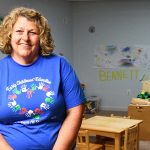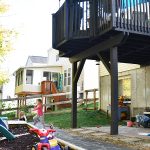NOVEMBER 2020 \\ CERTIFIED FAMILY CHILD CARE
For Kelsey Lee of Morgantown, locking in quality child care was such a priority that she put her name on a top local provider’s waiting list while she was pregnant. More than five years later, she said that decision has helped her son be more than ready to thrive in kindergarten next year and in the school years ahead.
“He knows how to write his first and last name, and he can recognize every letter,” Lee said of her son, Walker. “He knows what letter everybody’s name in the family starts with — I can put down a letter and he knows who it goes with.”
Kelsey credits certified child care provider Lisa Lee (no relation to Kelsey) with instilling basic academic skills, interesting conversation, and strong social habits for the six children who buzz around the center created in Lee’s converted basement and sprawling backyard.
Kentucky officials are working to expand the ranks of providers like Lisa Lee, who opted for extra training to boost the learning experiences she can provide youngsters she cares for in her home. Across Kentucky, the need to increase access to quality child care is deep.
The state’s goal is to increase the ranks of certified family child care providers — adults who care for 10 or fewer children in a home setting — to assure child safety, build students’ school readiness, and raise the professionalism of providers to see themselves as accomplished small business owners.
State officials and early care advocates are promoting the benefits of becoming certified among small-scale child care providers currently operating outside of state regulations. They also aim to make more families and parents aware of the benefits of seeking providers certified or licensed by the state.
“Because of limited awareness of what certified family child care is, these providers are a hidden gem in a lot of communities,” said Jessica Cain, program coordinator for Expanding High Quality Family Child Care in Kentucky through the state’s Division of Child Care. “If parents knew what to look for, this could be utilized a lot more.”

LISA LEE OF MORGANTOWN operates Lee’s Family Childcare from her rural home. She has become state certified and worked to achieve top quality rankings.
Currently in Kentucky, child care is often delivered by unregulated providers — typically family members, neighbors, or friends watching a few children in their homes. Adults caring for young children whose families receive child care assistance are expected to be registered as early childhood professionals. Becoming “registered” requires basic criminal background checks and an inspection to assure safety and health conditions.
The next step for providers — moving from registered status to becoming certified or licensed — permits home-based care for larger numbers of children while also offering providers coaching in quality learning experiences, awareness of school readiness skills, and resources that can range from access to federal food programs to ways to sharpen organizational and business skills.
Increasing the skills of local, small-scale child care providers is a practical strategy for increasing the quality of early childhood learning and school readiness in Kentucky, proponents of family child care programs say. They point to providers who opted to become certified or licensed to show how the steps connect with improved results for providers and children alike.
Lisa Lee of Morgantown, who serves six children from her home at the end of quiet country road, said the state assistance for certified providers marked a big step forward for her ability and what she can help children accomplish. She first got involved in child care as a picky young mother looking for a strong preschool experience for her young son.
“I couldn’t find a daycare that suited me. I knew what I wanted for my child and couldn’t find it,” she explained. Over time, and working through the certified family child care program, she has increased her own knowledge to the point where she can track the development of the two-year-olds who start in her home as become five-year-old learners eager to keep learning at home and ready to thrive at school.
Because of limited awareness of what certified family child care is, these providers are a hidden gem in a lot of communities.
— Jessica Cain, program coordinator for Expanding High Quality Family Child Care in Kentucky
“We focus on how they get involved in group play — that’s how we all learn,” Lee said. “I want every child who leaves here to be someone who enjoys learning and believes there is nothing they can’t learn. I find what they are interested in and tap into that.” A typical day at her center may provide time for playing instruments, marching, painting, working with measuring cups in the sandbox, telling stories, learning new words, or trying to find answers to others’ questions.
“Kentucky has the best resources — we get so much help,” Lee added, pointing to collaboration with state early childhood program staff as a major force in building the reputation of her center, Lee’s Family Childcare.
In the quiet backyard of a closely packed Northern Kentucky subdivision, Francie Allison leads a group of up to 10 children. Days at her home-based center move from learning in a basement classroom to time for snacks and naps to activity in the family’s backyard where plastic cars, sidewalk chalk, and tee-ball await.
Jodie’s House Daycare is the product of 14 years of training and improvement since Allison decided to stay home to care for her own child and watch another child or two.
“It took me a while to get established and be certified,” she said. Her path included attending community college courses, partnering with state officials to learn how the bigger system worked, and studying how to meet young children’s needs.
“I love, love, love what I do,” Allison said. “It was built within me to be a teacher.”
“In the beginning, I was able to stay home with my child and make sure she’s succeeding,” Allison added. “I decided bring others in for socialization, but I got to see them all succeed. I gave them a place that was safe and loving.”
Some people may feel like they don’t want the state checking on them, but I look at it that it makes me a better, safer provider.
— Francie Allison, state licensed child care provider
Allison’s center has become a place where she continues learn and grow professionally while creating a stimulating atmosphere for children. By becoming certified and eventually licensed by the state, Allison mastered areas like assessing student progress toward school readiness. She can show parents how children are learning academic and social-emotions fundamentals and explain what areas can be worked on at home.
“I like being my own boss,” Allison said. “There is a great support system out there that will help you step by step. Everything you join benefits you.”
“Some people may feel like they don’t want the state checking on them, but I look at it that it makes me a better, safer provider,” she added.
Rachel Battaglia, a young parent in Carrollton, said that finding quality child care is a big challenge. She found a certified provider for her son — now almost two years old — who knows how to work with his speech delay in addition to providing a homey, playful environment where development as a learner is a priority.
“The home environment is a huge advantage,” said Battaglia, a third-grade teacher. She is impressed by the skills that Robin Fremin, her provider, demonstrates. “I see her working with them on reading and prompting and so many developmentally appropriate activities with kids. There’s so much she does that’s educational.”
Battaglia said that parents are often unaware of how to evaluate child care options. Limited options and tight family budgets can be more pressing factors.
Parent Jennifer Malicoat of Cincinnati said that her positive experience with a skilled family child care provider led to her current work in Northern Kentucky encouraging more providers to work toward becoming certified.

CHILDREN AT JODIE’S HOUSE DAYCARE, which Francie Allison of Independence named for her daughter, play in the suburban backyard.
“We found quality care in a great community space that felt like another family,” Malicoat said of her own experience finding quality child care for her two sons.
In a field that often operates as an underground enterprise, the chance to join an organized network can be a major step forward for providers, Malicoat said. Access to curriculum, screening tools, participation in government assistance and programs can help people who might think of themselves as small-time babysitters see a bigger future as early education professionals and small business owners.
Optimizing providers’ skills helps lift options for children and families at a pivotal stage. “Those years are so crucial,” Malicoat said.
Certified family child care providers can build expertise for helping children with special needs or guiding families coping with individual challenges, added Cain of the state child care agency.
As Kelsey Lee of Morgantown reflects on how a certified family child care provider boosted her oldest son’s progress, she shares her eagerness for her twin sons, now two years old, to have the same opportunity. They remain on Lisa Lee’s waiting list but are assured spots when older children, including their brother, start school in the fall.
“Availability is the hardest thing,” said Kelsey, who operates a convenience store that she owns with her family. “It’s great to find someone who can get them where they need to be.”
\\
TOP PHOTO: Francie Allison, a licensed provider and owner of Jodie’s House Daycare in Independence, talks to children in her backyard play space.
BRIGHT SPOTS EXTRA \\ MORE ABOUT CERTIFIED FAMILY CHILD CARE
The state Cabinet for Health and Family Services operates the Division of Child Care. Its Department for Community-Based Services works with individuals building home-based child care businesses.
Their materials explain the system’s three basic levels:
REGISTERED EARLY CHILDHOOD PROFESSIONAL — Typically a family member, friend or neighbor who cares for children in his or her own home or the child’s home. A registered early childhood provider may not care for more than three children unrelated to the caregiver or more than six children if they are a sibling group.
CERTIFIED FAMILY CHILD CARE — Care provided in a caregiver’s own home for no more than six unrelated and no more than four related children at any time (total of 10 children).
LICENSED CHILD CARE Type I (for centers) and Type II (for home-based providers) — A licensed Type I child care facility is a facility that regularly provides child care services for four or more children in a non-residential setting; or 13 or more children in a residential setting. A licensed Type II child care facility is the primary residence where child care is regularly provided for at least seven, but no more than 12 children, including no more than 12 children related to the licensee.
Find out more about the state’s child care system and quality measures.
Parents or the public can use the state’s Public Child Care Search to see certified or licensed providers. That system shows inspection reports, hours of operation and quality levels under the Kentucky All STARS system.





Comments are closed.